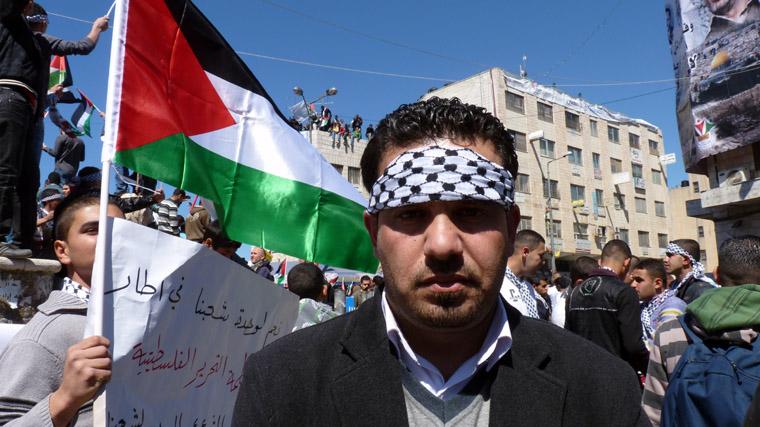Palestinian demonstration in West Bank
By Matthew Bell
Thousands of Palestinians took to the streets in towns and cities of the Gaza Strip and the West Bank today to call for political unity. Demonstrators said they want an end to the division between Gaza — controlled by the Islamist group Hamas — and the West Bank, which is run by the Fatah-dominated Palestinian Authority.
In the West Bank city of Ramallah, hundreds of Palestinians gathered in the mid-day sunshine to send a message to Palestinian leaders:
“The people want an end to the state of divide,” was a common refrain chanted by groups of protestors.
The rift between between Hamas and Fatah opened up in 2007, when a short-lived unity government fell apart and Hamas took control of Gaza in a violent coup. There have been reconciliation efforts since then, but to no avail.
One youth organizer, Mahmoud Nawajaa said it’s high time for the two sides to reconcile. Then, he said, they can finally bring an end to the Israeli occupation.
“We need to be in one,” Nawajaa said. “To make free [our] Palestinian state.”
There is deep hostility between the two factions, but Nawajaa said they can overcome.
“The people are here and the demonstration here is to keep the pressure on Fatah and Hamas to end the division,” he said. And if they don’t want to, Nawajaa added, it doesn’t matter, because unity is the will of the Palestinian people.
Another Palestinian activist — this one in his 70s — Munib Masri pointed out that the majority of the population in the West Bank and Gaza is made up of young people.
Masri said the leaders of Hamas and Fatah need to listen to what’s being said at demonstrations like this one.
“This is a title wave,” Masri said. “If they are smart here and smart in Gaza, they will appreciate of these people’s wish and come closer.”
If the leadership from Fatah and Hamas fail to do so, he said, they will risk being swept away by this tidal wave.
Palestinian leaders on both sides of the divide do not take threats to their authority lightly. Fatah and Hamas have put a stop to recent attempts to organize demonstrations.
Protestors in Ramallah today were quick to say that they are not calling for regime change. Iyad Masawi said there is “no comparison” between what is happening in the West Bank and what happened in Egypt.
Masawi said, “Palestinians want to end the political division so they can end the Israeli occupation.”
That is a message both of the main Palestinian factions have said they support.
Fatah leader Nabil Shaath said he came to al-Manar square today not to hijack the wave of popular protest, nor to try and squelch it.
“We are not a despotic regime like the previous Egyptian regime,” Shaath said.
“We are an authority that is occupied by Israel,” he said. “We are a people whose land is being stolen from under our feet and so, what we need is different from what the Tunisians wanted, the Egyptians wanted and what the Libyans want.”
Hamas activists from the West Bank were also in attendance in Ramallah today, though in smaller numbers. Ayman Daraghmeh said Palestinians are coming together for another reason, and that is because they oppose US foreign policy.
Daraghmeh said, “everyone here is saying ‘no’ to the same American policy,” which “always goes” with Israel.
But at least some Palestinian authorities are saying ‘no’ to the demonstrations. In Gaza late today, several hundred Hamas supporters reportedly stormed a crowd of protestors who refused orders to disperse after holding a demonstration.
In Washington, US officials have shown little enthusiasm for a reconciliation between Fatah and Hamas.
Though the United States called for Palestinian elections in 2006 — which Hamas won — the US still considers the Islamist group to be a terrorist organization.
The same goes for Israel.
And on that note, Israeli officials today said their military intercepted a ship full of weapons that they suspected were en route to the Gaza Strip.
